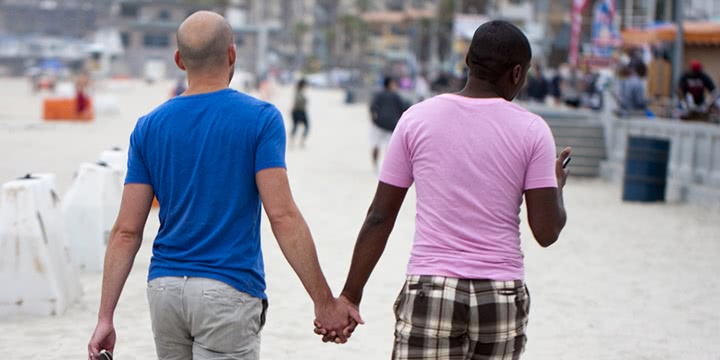Last week, news broke of two particular instances of homophobia around Australia – that of a man who wasn’t recognised as next of kin following the death of his partner, and that of a family repeatedly asked to move seats on a Qantas plane to make way for a married couple.
What struck me about both of these stories, but particularly the Qantas incident, is that it seems people aren’t able to recognise homophobia for what it is.
One article about the Qantas incident noted that Qantas donates to Mardi Gras, and that its CEO, Alan Joyce, is openly gay – in a way indicating its employees’ behaviour was excusable. This kind of argument is akin to the ‘I can’t be racist because my friend is black’ line of thought, which ignores the fact these kinds of identity oppressions occur on a much more systematic, structural level (and also forgets that gay people can be homophobic too).
A company may do all it can to proclaim inclusivity – donate to Mardi Gras, write LGBTI-friendly policy and so on – but it does little to change the fact that we have, and will continue to have for probably some time, an inherent bias to the dominant relationship structure; that is, married heterosexuality. In a world dominated by heterosexuality, it’s easy to assume a man and a woman together are in a relationship, while a gay relationship (particularly between two women, given the inherent invisibility of lesbianism due to greater visibility of gay liberation, greater visibility of female friendships, and the subordination of women generally) is far less obvious, due to our inherent heterosexual bias.
Structural homophobia is everywhere. There is little to no research on lesbian transmission of STIs, because it seems less prevalent, and so it therefore becomes less worthwhile to research and understand. Similarly, I’ve had countless doctors who’ve asked “Are you pregnant?” and when I answer with a firm “No”, their response is always, “But how do you know? Condoms and the pill aren’t foolproof.” No, but being in a monogamous relationship with a cisgendered woman is pretty foolproof.
Gay men still can’t donate blood, because of the HIV risk – despite the fact testing is becoming more advanced, medication is making viral loads undetectable, and young, straight women are the group of people with the fastest-growing virus rates in Australia.
Religious schools and hospitals can still fire gay teachers and doctors for their sexuality. And while many don’t, it still means these teachers and doctors have to think very carefully about disclosing personal information, while their straight colleagues proudly display pictures of their wives and kids.
Most people, particularly in the cities, are becoming great allies. But homophobia still exists in your assumptions, and your ignorance to your own immunity from daily microaggressions. When you make polite conversation by asking a girl if she’s got a boyfriend, you’re assuming she’s straight. When you walk down the street holding hands with your straight partner, you forget that the two men behind you might be wanting to do the very same, but fear harassment. When you take that partner to family dinner, you might be blissfully unaware that your gay cousin desperately wanted to bring his boyfriend, but thought it might be too awkward, or make the evening ‘too much about him’. And when you devalue one family in order to make way for another, as Qantas did, you’re telling that family that it’s not worth as much.
Gender stereotyping is entrenched in a privileging of heterosexuality, too. When you ignore the man who comes into your make-up store because he couldn’t possibly be wanting to be served, you’re saying that men can’t be feminine. When your butch friend puts on a skirt for a special event and you gush at just how pretty she looks, you’re reminding her that her usual, more masculine presentation isn’t as good. This also plays into instances of transphobia, which is much more rampant and overt than homophobia today.
Being a good ally means more than just supporting marriage equality and waving a flag at Mardi Gras. That’s a good place to start, but a better one is recognising that your privilege might be so unconscious you don’t even notice how hard others have it.
[Image courtesy Nathan Rupert/Flickrflickr.com/photos/nathaninsandiego/]
This Week…
Secret Garden Bar in Enmore finally got its liquor licence approved! Starting this Wednesday November 18, and every Wednesday after, is Sasslife. Harking back to the old Homosocial days, this Wednesday features Malo, James i.V [above], Ratchet Glamma, Chi Chi, and visuals from Hayley Coghlan.
Queer performance collective Gang Of She [below]has an exhibition at 107 Projects, showing Thursday November 19 – Saturday November 21. The artists have created a womb filled with their collective and individual works, where you can drink and party as well as witness the spectacle.
The boys from L’Oasis are organising their fourth party this Friday November 20 at Slyfox. Titled The Gutter and The Stars, this one features both L’Oasis and Stereogamous.
Then on Saturday November 21, head to the Oxford Hotel for this month’s instalment of Heaps Gay, featuring Wild Sunset, Cunningpants, Sveta[below], Adi Toohey and heaps of others.





































